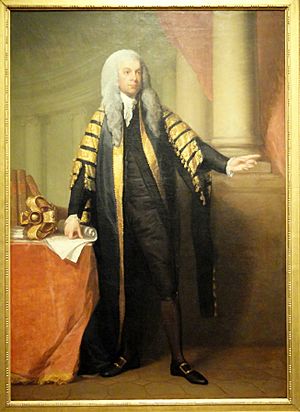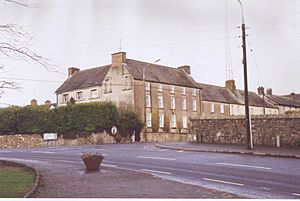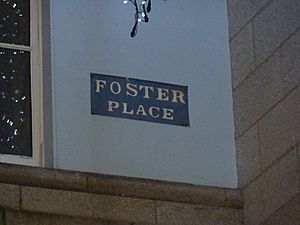John Foster, 1st Baron Oriel facts for kids
Quick facts for kids
The Lord Oriel
PC (Ire)
|
|
|---|---|

portrait by Gilbert Stuart
|
|
| Chancellor of the Exchequer of Ireland | |
| In office 30 April 1807 – 1811 |
|
| Monarch | George III |
| Prime Minister | The Duke of Portland |
| Preceded by | Sir John Newport, Bt |
| Succeeded by | William Wellesley-Pole |
| In office 9 July 1804 – 24 February 1806 |
|
| Prime Minister | William Pitt the Younger |
| Preceded by | Isaac Corry |
| Succeeded by | Sir John Newport, 1st Baronet |
| In office 23 April 1784 – 17 September 1785 |
|
| Preceded by | George Ponsonby |
| Succeeded by | Sir John Parnell, 2nd Baronet |
| Speaker of the Irish House of Commons | |
| In office 1785–1800 |
|
| Monarch | George III |
| Preceded by | Edmund Pery |
| Succeeded by | Office abolished (Cathal Brugha as Ceann Comhairle) |
| Personal details | |
| Born | 1740 |
| Died | 23 August 1828 (aged 87–88) |
| Spouse | |
John Foster, 1st Baron Oriel (born in 1740, died on August 23, 1828) was an important Anglo-Irish politician. He held a very significant job three times: Chancellor of the Exchequer of Ireland. He was also the very last Speaker of the Irish House of Commons, a bit like the leader of the Irish Parliament.
Contents
John Foster's Early Life
John Foster was born in 1740. His father, Anthony Foster, was a judge called the Chief Baron of the Irish Exchequer. John grew up in a place called Merville, which is now part of University College Dublin. He also inherited a beautiful home called Collon House in County Louth from his father. John made many improvements to Collon House and its gardens. The gardens became famous for their wide variety of trees and shrubs.
His Political Journey
John Foster started his political career in 1761. He was elected as a Member of Parliament (MP) for Dunleer in the Irish House of Commons. He was very good at understanding money and business matters.
In 1784, he became the Irish Chancellor of the Exchequer. This role was like being the main financial minister for Ireland. He introduced a law that helped farmers. This law gave money to people who exported corn and put high taxes on corn brought into the country. This change helped Ireland become a country that grew a lot of crops instead of just having pastures for animals.
In 1785, John Foster became the last Speaker of the Irish House of Commons. This was a very important job, as the Speaker leads the discussions and keeps order in Parliament.
A Big Decision: The Act of Union
John Foster was also an MP for County Louth from 1768 until 1801. During this time, a major event happened: the Act of Union in 1801. This act joined the Kingdom of Ireland with the Kingdom of Great Britain to form the United Kingdom.
John Foster was strongly against this Union. Some people said he opposed it because he felt disrespected by English officials in London. They apparently made fun of his Irish accent. When he returned to Ireland, he began a strong campaign against the Union.
He famously refused to give up the Speaker's mace. The mace is a special staff that symbolizes the authority of Parliament. His family kept it, and you can still see it today in Parliament House, Dublin, which is now the Bank of Ireland.
After the Act of Union, John Foster continued his political career in the new United Kingdom Parliament. He was an MP for County Louth from 1801. He served again as the Irish Chancellor of the Exchequer from 1804 to 1806.
In 1821, he was given a special title and became a peer of the United Kingdom. He was known as Baron Oriel. He passed away on August 23, 1828.
Family Life
In 1764, John Foster married Margaretta Amelia Burgh. Her father, Thomas Burgh, was also an MP. John and Margaretta had two sons and one daughter.
Their elder son, also named John Foster, was an MP for Dunleer but sadly died young.
His wife, Margaretta, was also given special titles. In 1790, she became Baroness Oriel, and in 1797, she became Viscountess Ferrard. Their younger son, Thomas Henry, inherited these titles. His descendants later became the Viscounts Massereene.
John and Margaretta's daughter, Anne, married James Blackwood, 2nd Baron Dufferin. She lived to be 93 years old.
John Foster's younger brother, William Foster, became a bishop.
Images for kids
 | Janet Taylor Pickett |
 | Synthia Saint James |
 | Howardena Pindell |
 | Faith Ringgold |






